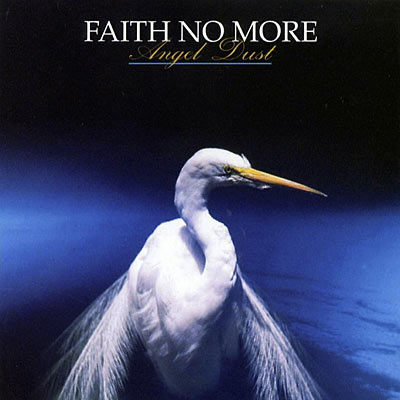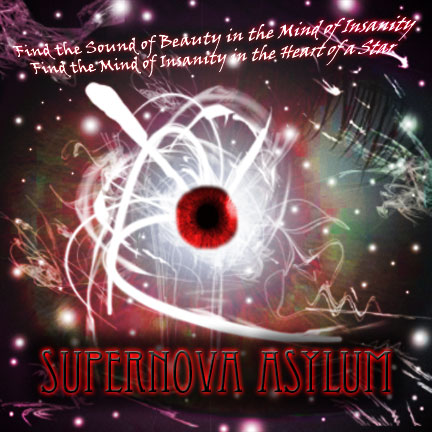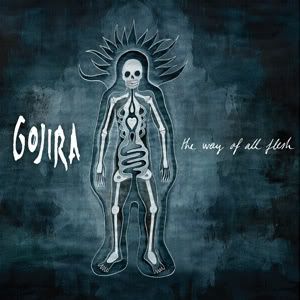Artist: Faith No More
Genre: Avant-Garde / Experimental Rock
Length: 1:01:54
Release Date: June 8th, 1992
Label: Slash
Producer: Matt Wallace, Faith No More

Despite having just recovered from the rousing financial success of their 1989 release, The Real Thing, the wildly experimental rock group Faith No More denied the push for greater mainstream appeal, pulling a 180-degree turn and taking an entirely different approach to their sound. The result, Angel Dust, has proven to be one of greatest examples of success through experimentation and avant-garde mentality over stagnation and repetition.
It has also proven to be nuttier than peanut brittle.
Now, I’ve received some flak in the past for languishing on albums which hammer about on gimmicks and genre-benders rather than create a unique, self-proclaimed niche…not like I’m pointing fingers or anything [insert evil glare at Beck here]. At first glance, Angel Dust is nothing if not a “gimmick album”, sometimes completely hiding its hard rock foundations behind layers of bizarre genre insertions. Moments of thrashing metal or ballad-rock-esque riffage are certainly present, and indeed form the core of the Faith No More experience, but they tend to be masked by the outright twisted diversions the album often takes. Whether it’s cheerleaders chanting in the background of Be Aggressive, or the presence of sudden choir organs at the end of Jizzlobber (yes, Jizzlobber), there’s almost always something in each track meant to distract the listener from the band’s true roots. It’s often in these situations that I’m reminded of a magician performing a trick; it’s all about the spectacle and flair, meant to draw the eye (or, in the case of music, ear) from what’s really going on, never giving the audience a moment to wonder whether or not there’s any substance that lies behind the façade.
But in Faith No More’s case there is, and there are two simple reasons why: the risks they take are A.) justified, and B.) performed with elegance and class. You could certainly pick apart the album’s moments of mind-splitting, acid-tripping freak-outs and argue whether all of them are really necessary, but overall they tend to delightfully serve as means to an end, rather than the end itself. Take, for instance, one of the oddest of the bunch RV; here, multi-talented vocalist Mike Patton adopts the low-pitched, grumbling persona of a low-income, trailer-trash father, and describes – amidst the backdrop of a country-tinged guitar and fiddling piano – the utter amounts of sloth, stubbornness, and regret that define his pathetic life. You’re right to think that it sounds silly, and indeed the song will probably have you in stitches by the time Patton starts his lower-class rant about how his “pants fall down every time I bend over”, but there’s no denying it works. In addition to holding interest, this approach adds infinitely more credibility to the statement that the song is attempting to make about middle-America. Call it a gimmick, if you must, but while most gimmicks repel, this one sucked me in like a black hole.
Angel Dust is full of these brilliantly executed left-field moments, even in the times when the band is getting their rock on. Album opener Land of Sunshine is one of the more straightforward thrashers occasionally exhibited by the record, but when a series of descending keyboard notes give a dark, carnival-esque flavor to the proceedings, it makes even the straightforward seem intriguing and engaging. It even possesses some of the earliest proto-typical instances of rap meeting metal, lending to a nu-metal vibe that’s almost strong enough to promote mental images of Jonathan Davis and Fred Durst sitting outside the recording studio with a pen and notepad in hand, giggling wildly in hysteria. Other moments are simply, as the saying goes, “full of win”, such the track Crack Hitler (yes, Crack Hitler), which opens with guitar-scratching and funky bass so reminiscent of 80’s streetwise cop thrillers that it feels like it could be a suitable intro theme to Magnum P.I., or Midnight Cowboy, which is actually a cover of the theme of the 1969 drama film of the same name. And believe me, anything that could get to say words like this in a non-ironic manner is truly a few screws loose, if you catch my drift.
Of course – or at least as is my understanding – experimentation means nothing if the fundamentals aren’t in place, and Faith No More is at least competent in this area as well…unlike some people [insert evil glare yaddayaddayadda]. Patton’s aforementioned vocal talents are the strongest asset on display, capable of adapting to any needed role, from creepy whispers to fevered shouts to…yes, the rapping. The guitar tone and playstyle does not drift far from contemporary rock styles of the time, but it is executed with class, complexity, and even a few proggy outbursts. Interesting to note is that the bass and keyboards are practically just as prominent in the mix, if not more so, which lends a funky twist to the music. Surely, nothing about the music remains as interesting when the band’s experimenting gears aren’t spinning, but as far poppy, metal-tinged rock goes, it’s actually quite good in small doses, at least until the weirder stuff kicks in and things become deliciously haywire.
While this is certainly the magnum opus of Faith No More, and a prime example of how to properly create avant-garde music without complete failure, it is by no means perfect. In an album so rife with experimentation, it’s inevitable that some of them miss their mark with certain audiences; I, for one, did not gel with the rapping sections, though that may be because rap and metal usually mix about as well as pickled relish and raspberry jam. It’s also a tad on the long side, which may mean your interest may run dry over the course of a sustained listen. And indeed, as hinted before, one cannot shake the feeling that the underlying foundations aren’t nearly as stable without the extraneous layers to support it. And yet, for all its eccentricity, Angel Dust is still a work of art. With a bounty of clever ideas, thought-provoking lyrical themes, and even some catchy riffs here and there, it stands atop a pantheon of musical oddities to remain treasured as an influential classic. If nothing else, it’s good for at least one listen to absorb the kookiness that dwells within, as well as to affirm the idea that one does not need to be bland to be successful.
.jpg)


EYE.jpg)